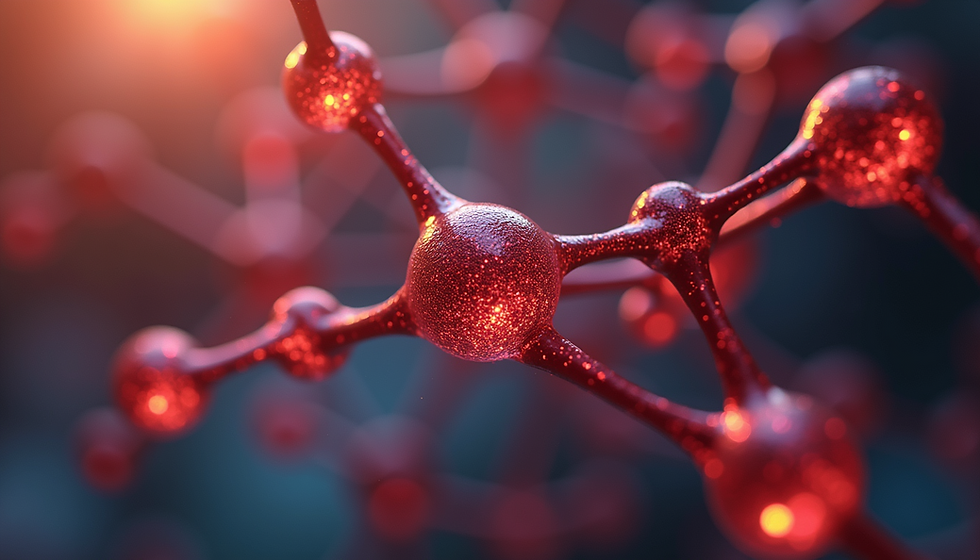Is Your Testosterone Tanking? Discover How Seed Oils and Toxins Could Be the Culprits
- Kristina Reynolds

- Jul 18, 2025
- 4 min read
Updated: Jul 21, 2025

Have you recently thought about your testosterone levels? Surprisingly, this isn’t just a concern for older men. Research shows that even younger men are experiencing a testosterone crisis. A study published in Fundamental Toxicological Sciences highlights a concerning trend: dietary rapeseed oil (Canola oil), commonly used in processed foods, can suppress natural testosterone production.
To put this into perspective, today’s average 22-year-old man has testosterone levels lower than those of a 70-year-old in the 1970s. This decline is alarming and is linked to falling sperm counts and increased infertility rates. The prevalence of these issues has doubled since the 1950s. Addressing this health crisis requires us to look closely at our modern lifestyles, including our diets and exposure to environmental toxins.
Understanding Testosterone: The Basics
Testosterone is often labeled as the male hormone, but it’s vital for both genders.
It impacts various bodily functions such as:
Fertility
Libido
Muscle mass
Bone density
Overall mood
Gut health
Energy
A drop in testosterone can lead to fatigue, depression, and reduced fertility. Understanding the drivers of testosterone production is essential for anyone interested in maintaining health and vitality.
The Role of Diet in Hormonal Health
How do dietary choices affect testosterone levels? The answer lies in the fats we consume. Some oils prevalent in modern diets, like canola and grape seed oil, can disrupt hormonal balance.
Studies reveal that rapeseed oil can inhibit testosterone production. This disruption occurs because these oils can raise testicular temperatures and hinder the expression of the StAR gene, which is crucial for testosterone synthesis. If you find yourself frequently buying processed foods, or cooking with these oils, you may be harming your hormonal health without realizing it.

The Epidemic of Endocrine Disruptors
An urgent issue affecting testosterone levels is the growing presence of endocrine disruptors in our environment.
These harmful substances can be found in everyday items, including:
Pesticides on fruits and vegetables
Chemicals in plastics
Ingredients in personal care products
Exposure to these compounds can damage our hormonal systems, leading to lowered testosterone production and fertility. Stress from modern life, combined with these environmental toxins and poor dietary choices, contributes to a dramatic decline in testosterone levels.
Why the Shift?
Since the 1950s, fertility rates have noticeably declined—signaling broader health issues.
Currently, around 90% of men have been found to have low testosterone levels, indicating a troubling trend. Dietary and lifestyle habits have shifted dramatically, with processed carbohydrates and seed oils overshadowing traditional fats.
As a result of this change, combined with increased stress and insufficient sleep, we are facing a perfect storm for declining testosterone levels.
Foods to Increase Testosterone: The Right Fats Matter
If seed oils should be avoided, what can you eat to boost testosterone levels?
Research shows that healthy fats, such as beef tallow, coconut oil, and grass-fed butter, can enhance testosterone production. These fats provide sustainable energy sources and encourage hormonal health.
Additionally, carbohydrates are essential for maintaining testosterone levels. They help lower cortisol—often linked to stress—thereby promoting hormonal balance. For example, including sweet potatoes and quinoa in your diet can provide these benefits.

Exercise and Lifestyle – The Twin Pillars of Health
Diet is only part of the equation. Exercise is equally vital for increasing testosterone levels.
Regular physical activity, especially strength training, can stimulate testosterone production. Studies indicate that high-intensity workouts can lead to immediate boosts in testosterone, contributing to better hormone regulation.
Sleep is another crucial factor. Aim for 7-9 hours of quality sleep each night. Restful sleep helps to maintain hormonal balance, so prioritize a consistent sleep schedule.
The Risks of Extreme Diets
Though popular diets like Carnivore and Keto promise quick weight loss, they may not suit everyone, particularly younger men wanting to maintain healthy testosterone levels.
A low carbohydrate intake can elevate cortisol levels, further inhibiting testosterone production. It’s important to find a balanced diet that fits your unique needs instead of strictly adhering to one diet philosophy that may not support hormonal health.
Practical Steps for Boosting Testosterone
1. Ditch the Seed Oils
Begin by removing seed oils from your diet. Focus on healthier options like olive oil, coconut oil, and various animal fats.
2. Emphasize Animal Fats
Increase your intake of animal products. Grass-fed butter, beef tallow, and full-fat dairy are excellent sources that support hormone function.

3. Find Balance in Carbs
Embrace moderate carbohydrate consumption. Depending on how active you are, healthy carbs can help manage stress hormones and support metabolic health.
4. Prioritize Sleep
Aim for quality sleep by getting 7-9 hours each night. A regular sleep routine can greatly enhance hormonal regulation.
5. Stay Active
Incorporate regular exercise into your routine, especially strength training or high-intensity interval workouts, to support testosterone production.
6. Limit Endocrine Disruptors
Reduce exposure to endocrine disruptors. Opt for natural and organic products when possible to lower your chemical intake.
Taking Charge of Your Health
As many young men face a rising testosterone crisis, adjusting dietary choices and lifestyle habits can lead to significant improvements.
With evidence linking dietary rapeseed oil to lower testosterone levels, it’s time to rethink our food choices. By making smarter fat selections and maintaining a balanced diet, we can combat declining testosterone levels and enhance overall health.
If you have concerns about your testosterone levels or fertility, consider implementing these changes for a healthier future. Together, we can take charge of our health.
To schedule with Pro Health Functional Medicine contact 480.306.4372 or visit our website here.




Comments